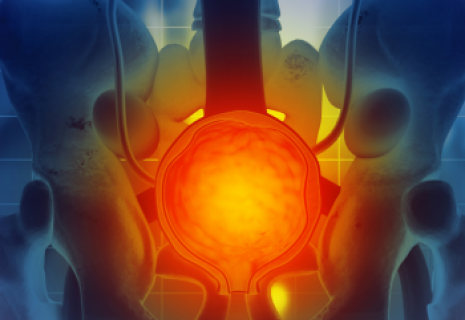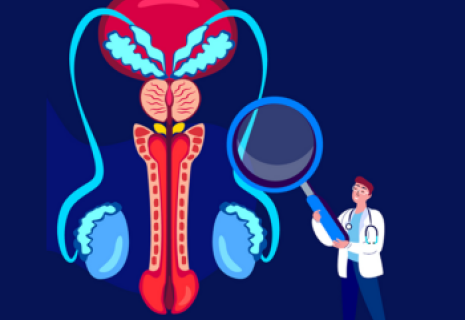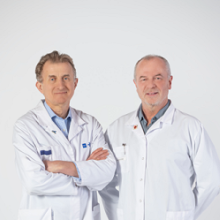
We combine surgical expertise and innovative therapies to treat cancers of the urinary system and male reproductive organs. Medical excellence and human accompaniment guide our team every day in providing our patients with the very best care
How we treat male urological and genital cancers
Urogenital cancers are tumours that develop in the urinary or genital system
Our team adopt a multidisciplinary and integrated approach that is totally centred on the patient. After an initial consultation with one of our specialists, your case will be considered individually at a Multidisciplinary Oncology Consultation (MOC) that every week brings together our experts for an in-depth analysis of each case and to draw up the best possible treatment plan
The following specialities are represented at every MOC:
• Urologists
• Radiotherapists
• Medical oncologists
• Nuclear doctors
• Radiologists
• Oncology Nurse Care Coordinators
Your treatment is not therefore entrusted to a single person but to a full team of specialists who coordinate their expertise to propose treatment solutions adapted to the latest scientific data. This cooperative approach is testimony to our commitment to providing quality care that is both rigorous and personalised.
Thanks to one of the most complete diagnosis and treatment arsenals in Belgium and our active involvement in many research projects, we are able to offer a wide range of treatment. All options are presented so that patients are actively involved in their treatment decisions, thereby strengthening genuine cooperation between the patient and care team.
Learn more about the Urology Departement
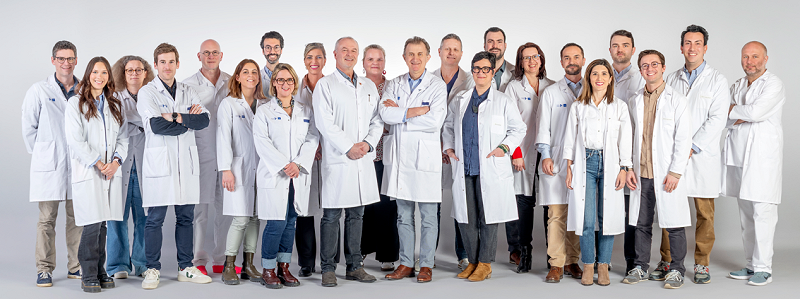
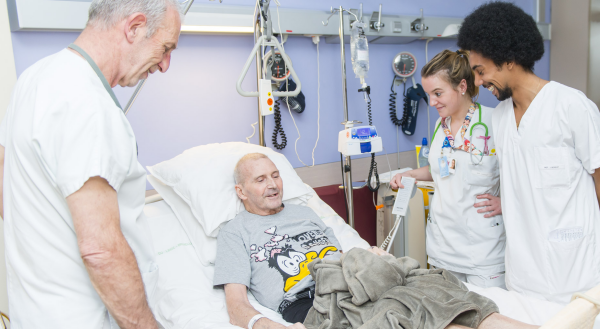 The Jules Bordet nurses, most of whom are specialised in oncology, are committed to accompanying patients with humanity, professionalism and consideration. Their role extends far beyond providing care and overseeing treatment as they make themselves available to families, listen attentively to patients and remain at their side to meet their needs. Education, information and support are inherent in their mission.
The Jules Bordet nurses, most of whom are specialised in oncology, are committed to accompanying patients with humanity, professionalism and consideration. Their role extends far beyond providing care and overseeing treatment as they make themselves available to families, listen attentively to patients and remain at their side to meet their needs. Education, information and support are inherent in their mission.
With solid relational, technical and scientific skills, the Jules Bordet Institute nurses are particularly attentive to relieving pain and to other symptoms associated with cancer treatment. They also play a role in training students, welcoming and supporting them as they transmit their passion and best professional practices.
To ensure optimal and coordinated care, the Jules Bordet Institute has also put into place a team of Oncology Nurse Care Coordinator (ONCCs). With a bachelor degree in nursing care and specialisation in oncology, followed by training in cancer care, the ONCCs are available to guide patients along their care pathway and to answer their questions.
Learn more about the ICSO
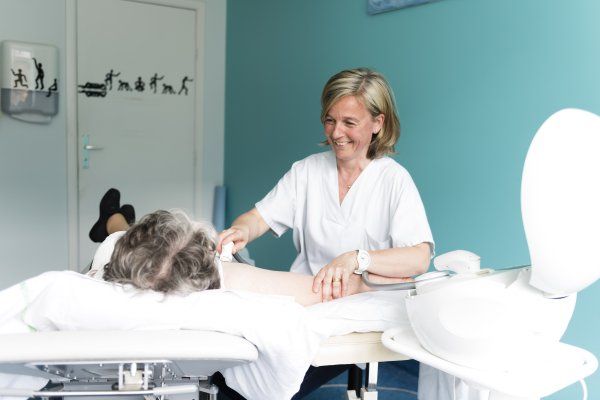 At the Jules Bordet Institute , the care of cancer patients extends far beyond medical treatment. During and after treatment, a multidisciplinary team of health professionals accompanies each patient to help them deal with the effects of the illness and its treatment. Consisting of doctors, specialised nurses, physiotherapists, psychologists, dieticians and social workers, the team is ready to respond to the physical, psychological and social needs of patients. Their mission is to provide a global and personalised follow up, providing the resources and advice to best manage the consequences of the illness and to favour an optimal quality of life during and after treatment
At the Jules Bordet Institute , the care of cancer patients extends far beyond medical treatment. During and after treatment, a multidisciplinary team of health professionals accompanies each patient to help them deal with the effects of the illness and its treatment. Consisting of doctors, specialised nurses, physiotherapists, psychologists, dieticians and social workers, the team is ready to respond to the physical, psychological and social needs of patients. Their mission is to provide a global and personalised follow up, providing the resources and advice to best manage the consequences of the illness and to favour an optimal quality of life during and after treatment
Learn more about :
Accompanying Care
Life after Cancer
Not all doctors and hospitals necessarily have the expertise, experience or technology required for optimal treatment of all types of cancer. Requesting a second opinion is therefore an important choice for your reassurance, especially in the case of complex and innovative treatment. It makes it possible to avoid errors, examine alternatives based on the latest medical progress and validate the treatment proposed at another hospital. In Belgium every patient is entitled to request a second opinion at any time in the course of their illness.
Obtaining a second opinion at the Jules Bordet Institute does not necessarily mean that you will subsequently be treated by our teams. Our role is to reassure you and discuss your case.
To obtain a second opinion simply make an appointment and our teams will direct you to one of our specialists.
Following the consultation, a collegial discussion is usually organised and a report drawn up. This report can then be consulted by the GP, external medical team and patient.
